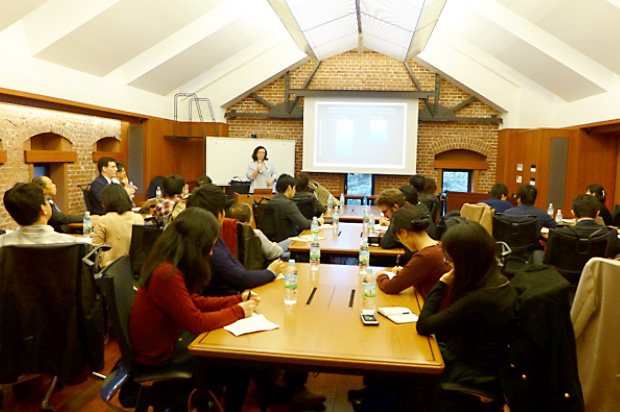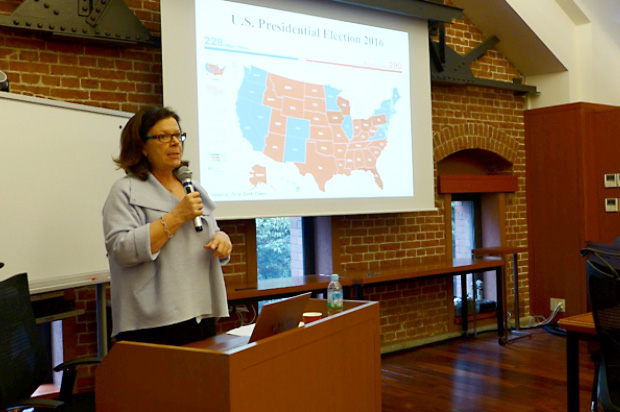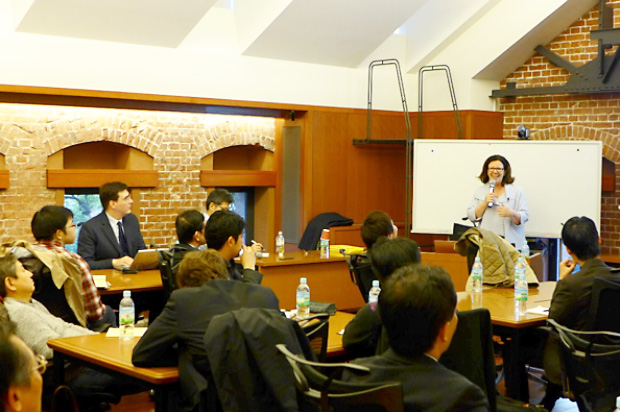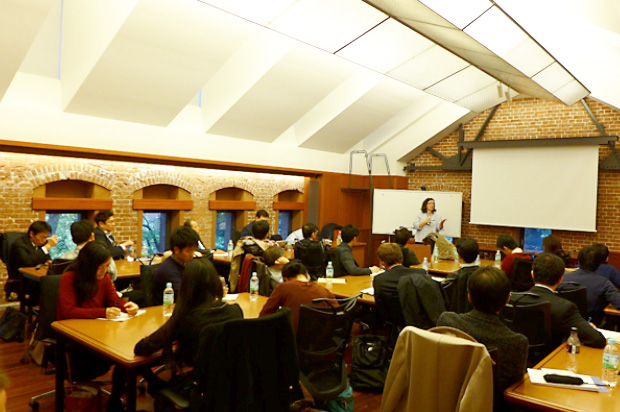SSU Forum with Dr. Sheila Smith
| Date: | Wednesday, November 16 2016, 15:00-16:30 |
|---|---|
| Venue: | Conference Room, 3rd Floor, Ito International Research Center |
| Subject: | Revisionism, Populism or Nationalism?: The Political Currents that Shape the U.S.-Japan Alliance |
| Lecture: | Dr. Sheila Smith, Senior Fellow, Council on Foreign Relations |
| Language: | English |
| Hosted by: | Security Studies Unit, Policy Alternatives Research Institute, the University of Tokyo |
The Security Studies Unit (SSU) was delighted to host Dr. Sheila Smith, senior fellow of the Council on Foreign Relations and authors of numerous contributions on Japanese foreign policy and the US-Japan alliance (see her latest book Intimate Rivals: Japanese Domestic Politics and a Rising China), who delivered a talk entitled “Revisionism, Populism or Nationalism?: The Political Currents that Shape the U.S.-Japan Alliance”.

The event was chaired by Akio Takahara, Professor of Chinese Politics at the University of Tokyo and member of the SSU. He introduced the speaker as a very distinguished scholar who has greatly contributed to the understanding of the US-Japan alliance dynamics, especially concerning the question of the US military presence in Okinawa.
Dr. Smith thanked the hosts and organisers of this event, and proceeded immediately by introducing the topic of her talk, namely trying to assess the direction of the rather momentous events unfolding as a consequence of the unexpected outcome in the US presidential election. As much as domestic politics can shape and does shape international political postures and policies, the question is here what can be the consequence of Mr. Donald Trump’s success in becoming the next US president. This event ought to be read in the context of a general revival of nationalism, which is not quite unique to the American landscape. It seems that the same trend is rapidly expanding in Europe as well. A couple of years ago, Japan was also widely debated as the country where nationalistic forces seemed to be prevailing, particularly as a consequence of PM Shinzo Abe’s ascent to power.
Dr. Smith offered several insights in the elections results. Firstly, this has been a quite dramatic defeat for all “data people”, whose computerised forecasts have in the end missed the mark almost entirely. Secondly, the US will probably have a renewed national debate about the electoral college system, considering that Hillary Clinton had in the end more votes than Trump, although under the current rules the geographic distribution of the votes may determine, as in this case, the outcome of the election. Indeed Trump won by shifting few hundreds of thousands votes in a few states (crucially in Wisconsin, Michigan, and Pennsylvania). Thirdly, this election marks a severe crisis within the Democratic Party. Numerous registered democrats, as it appears, decided not to vote for Clinton. Some perhaps wished instead to have Bernie Sanders to run as Democratic candidate, but it appears that Clinton gained indeed less votes in those counties where she beat Saunders during the primaries.

Moving to the international implications of Trump’s victory, Dr. Smith highlighted a series of likely consequences, particularly for Japan, as well as a general sense of uncertainty. It is now practically certain that the US will withdraw from TPP, as President-elect Trump made this the core of his campaign. Yet this is actually a bi-partisan trend, with both republicans and democrats including candidate Clinton now converging on the general idea that the liberalisation of trade did not promote the economic welfare of numerous blue collar workers in the US. So despite the fact, according to opinion polls, the majority of Americans remain in favour of free trade, this stance has become more cautious. Crucially, there is a large discrepancy of views between elite circles (very much in favour of free trade) and the general population (much less favourable).
Coming to the question of alliances, and particularly the US-Japan alliance, Dr. Smith has remarked that the majority of Americans, including Trump supporters, appears favourable in maintaining existing ones, while new alliances may meet more resistance in the electorate. The least amount of support goes to US commitments to international (multilateral) agreements.
More in general however, it is practically impossible to predict the direction of US foreign policy under Trump. He announced that his first three initiatives will concern trade, namely: renegotiating NAFTA, withdrawing from the TPP, and denouncing China as a currency manipulator. Beside this, there is not much clarity at the moment. This is particularly true about the use Trump intends to do of US military power. Clearly, he does not share Obama’s interest in remaining involved in Syria, and may withdraw American support to the various opposition groups. He may seek a mutual understanding with Russia on many issues. However, he also intends to repeal the Iran deal, even if this may have vast implication for all other signatories.
In Northeast Asia, it is difficult to predict how North Korea will react to a Trump administration. It is possible to image that there may be new provocations from Pyongyang, as they always test the new U.S. administration by doing so.
One may speculate that Trump’s foreign policy could look like something in between G.W. Bush’s policy during his second mandate, and Reagan’s strategic initiative “peace through strength”, but there is no certainty at the moment, and many of Trump’s advisors seem to have quite a hard stance vis-à-vis China. It is too early to call him an isolationist, and he may not have a comprehensive strategy yet. It is highly probable that he will not internationally promote any value-based discourse, but may remain very pragmatic.
Finally, Dr. Smith anticipated that, barring a somewhat unlikely coming together of a rather fracture polity, there may be social unrest in the future of the US as communities become increasingly polarised. This transition may be a quite difficult one.

Dr. Smith took then a few questions from the audience.
Question: Trump’s first steps will concern trade policies, but they will be quite bald steps. How can the consequences of such stances be limited to trade and not spill over to other areas?
Answer: Indeed there will be consequences in other areas. Now it is difficult to envisage in which direction they will go. Canada has signalled that it is ready to open negotiations on NAFTA. TPP may survive without the US, although with a very different political outlook. Disputes with China may be channelled to and managed through the WTO, although this will probably not be the way things will unfold. Trump will certainly face considerable resistance (from the state bureaucracy for instance), particularly on those points of his agenda which are perceived as more extreme.
Question: How far can Trump go in pushing for a radical agenda? Is Congress going to check his moves? What about the military?
Answer: Concerning Congress, the Republican Party currently controls both houses. Trump will need congressional approval on his nominees, but not on a rather long list of presidential prerogatives, for example declaring China a currency manipulator. He may eventually make extensive use of executive orders, as already done by his predecessor President Obama. Other problems will arise from the financial feasibility of his spending programmes, such as for instance in terms of military build-up.
Question: Is there any rationale for the Republicans turning protectionists on trade?
In general there has been a concern about trade not much in terms of evaluating the outcome of globalisation, but particularly in terms of technological change impact in certain sectors. Now however there is a growing concern about the employment prospects of numerous blue collar, especially white males in the “rust belt” states, who appear to increasingly become an important electoral force for the Republican Party.
Question: Looking at possible silver linings to this election, NATO has welcomed the idea of its members doing more in terms of defence spending. How is Trump’s victory affecting the alliance with the Europeans?
Answer: The idea of a more balanced burden sharing has been around for decades, at least since the economic recovery of West Germany and Japan in the post-WWII period. Possibly NATO and South Korea will adopt the Japanese model, whereby Tokyo pays a large part of costs related to the stationing of US troops in Japan.
Question: Concerning the use of force, the Bush administration in his second mandate operated largely within the UN, and UN military operations actually escalated in that period. What are the prospects under Trump?
Answer: As Trump does not appear to be supporting democratic values, and indeed may challenge democratic values at home, it is very unlikely that he will support democratisation and a similar agenda at UN level. He may actually pursue a completely different agenda, one based on “peace through strength” but without the optimistic undertone.

Question: It seems that PM Abe is willing to work with Trump, but everybody was surprised by the election outcome.
Answer: It is actually not correct to say that nobody in Japan saw the possibility of Trump’s victory, indeed Japan’s ambassador in Washington Mr. Sasae clearly managed to get access to Trump’s inner circle in order to organise a meeting between the president elect and PM Abe only a week after the election. PM Abe has shown that he is quite good at personal diplomacy, but it remains uncertain to what extent he will be able to extract gains for Japan from this meeting.
Question: How is it possible to reconcile Japanese nationalism and more burden sharing in defence? How can Japanese nationalism influence the alliance dynamics?
Answer: There is a similar problem in South Korea. It is indeed quite hard to see how this dynamic will evolve. It is now difficult to tell what is going to “sell” politically in Japan, and what is going to be more problematic. On the other hand, Trump still has to deliver on anything, and his stance remains unpredictable. More in general, one can just say that PM Abe always wanted a more prepared and effective JSDF, and consequently on that point there may be a convergence between PM Abe and Trump.
